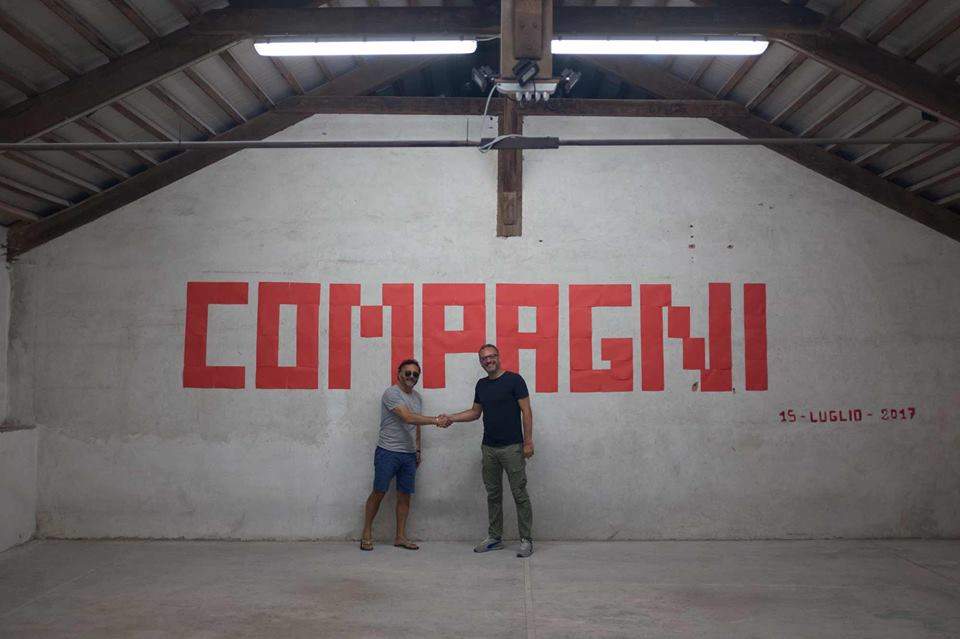An exhibition to investigate what meaning the word"Comrades" still has in contemporary society. It is the one that will open tomorrow in Carrara, in the brand new San Martino Arts Pole, and will be open to the public from July 16 to August 20. It is titled Comrades ! Contemporary Declinations and exhibits works by a close-knit group of artists belonging to the YAB group: Emiliano Bagnato, Cristina Balsotti, Carolina Barbieri, Simone Conti, Lorenzo Devoti, Sabina Feroci, Paolo Fiorellini, Lorena Huertas, Stefano Lanzardo, Melissa Mariotti, Roberta Montaruli, Enrica Pizzicori, Aurore Pornin, Francesco Ricci, Francesco Siani, Stefano Siani, and Zino (Luigi Franchi).
The theme, as anticipated, is the term “comrades,” which, writes curator Andrea Zanetti, “is not a word like any other,” because “it has crossed and marked” the 20th century “filling entire existences with meaning” and enclosing “enormous hopes, but equally bitter disappointments and dramas.” With various works ranging from painting to sculpture to photography, the artists (belonging to different generations: the youngest is 22 years old, the oldest is 60) will address this sensitive topic by questioning the “contemporary declinations” of the term companion. The exhibition is organized by YAB and CGIL Massa-Carrara, with the collaboration of Cristian Pardossi. Info at yabonlineblog.wordpress.com. Following is the curator’s text:
Comrades is not a word like any other.
Not for those born in the twentieth century.
Because that word the twentieth century passed through it and marked it, filling entire existences with meaning.
Comrades is a word that has encapsulated enormous hopes but equally bitter disappointments and dramas.
A word that for decades represented the boundary within which the “diversity” of a political community was recognized, when politics was in everything in life.
Community of destiny, an almost mystical meaning, probably rooted in its Latin derivation (cum-panis, person with whom to share bread).
It was a word that meant total self-sacrifice toward a cause one felt to be a part of; from ocean to ocean you could not find a comrade who could not illustrate his thoughts by holding together the new advances of real socialism with the organizational problems of the Unity Party in his neighborhood!
Comrades then was that word capable of making you think, at the same time, of the fact that wherever you would go you would find others fighting the same battle and of the smell of the kitchens of the Feste de l’Unità, with those sauces prepared by soft, chubby hands while the orchestra was rehearsing for the after-dinner show and a few volunteers were arranging the last things in the booths set up on breaks from work.
And today?
The word comrades seems to have disappeared from the political lexicon.
For that matter, any trace of the political community to which that word referred has been gone for quite a while, and what has sprouted from it by budding has become increasingly estranged from its identity and culture of origin, for better or worse.
Yet we would be wrong to say that the word, with its civic meaning has been “scrapped.”
First, because it still survives - and will until their last breath - in all those for whom that word is the synthesis of a life. But there is a second important reason why the word comrades is not dead: in fact, the more it leaves the dictionary of twentieth-century politics, the more its semantic spectrum widens to include various forms of solidarity.
So one is a comrade in school, in work, in life, in feelings, in civic commitment because one shares the fate of one or more collectivities, one participates in the life of a community, in something that goes beyond the mere individual dimension.
Similarly - and even more powerfully - we are comrades because we share the same hope, crammed into a dinghy crossing the rough sea at night, dreaming of a better future for ourselves and our children.
Come to think of it, in many cases, it is not the word comrades that has disappeared from the lexicon; it is we who have forgotten its deeper meaning, ceasing to “share bread” with anyone. Yet solidarity can be a powerful antidote against disintegration and inequality; it is the best cement for building new worlds that are open and full of “networks” that are not only digital, but physical, porous, made up of human exchanges, of hands that hold each other, of arms that support each other.
Because “we are saved and move forward only if we act together and not just one by one.”
Because those who have comrades never die.
The group of artists that over the past few years has represented the word community in a visual key, giving life to the exhibition-project #community and reflected on the need to reconstruct an identity of urban spaces in order to redefine the functions of places and the relationships that are consumed within them, today questions the contemporary declinations of the word comrades.
A journey in the making that from the solitudes of communities and their contemporary dynamics shifts to individual reflection as a necessary tool to redefine an us.
A group of artists, different in languages, age and origin, reconstructs a contemporary cross-section of the social, political and everyday reflections that are crossing our period.
Contemporary art as a tool to access the poetics of remembrance but also the harshness of the suggestions of the present.
 |
| What does the word "comrades" mean today? An exhibition opening tomorrow asks this question |
Warning: the translation into English of the original Italian article was created using automatic tools. We undertake to review all articles, but we do not guarantee the total absence of inaccuracies in the translation due to the program. You can find the original by clicking on the ITA button. If you find any mistake,please contact us.